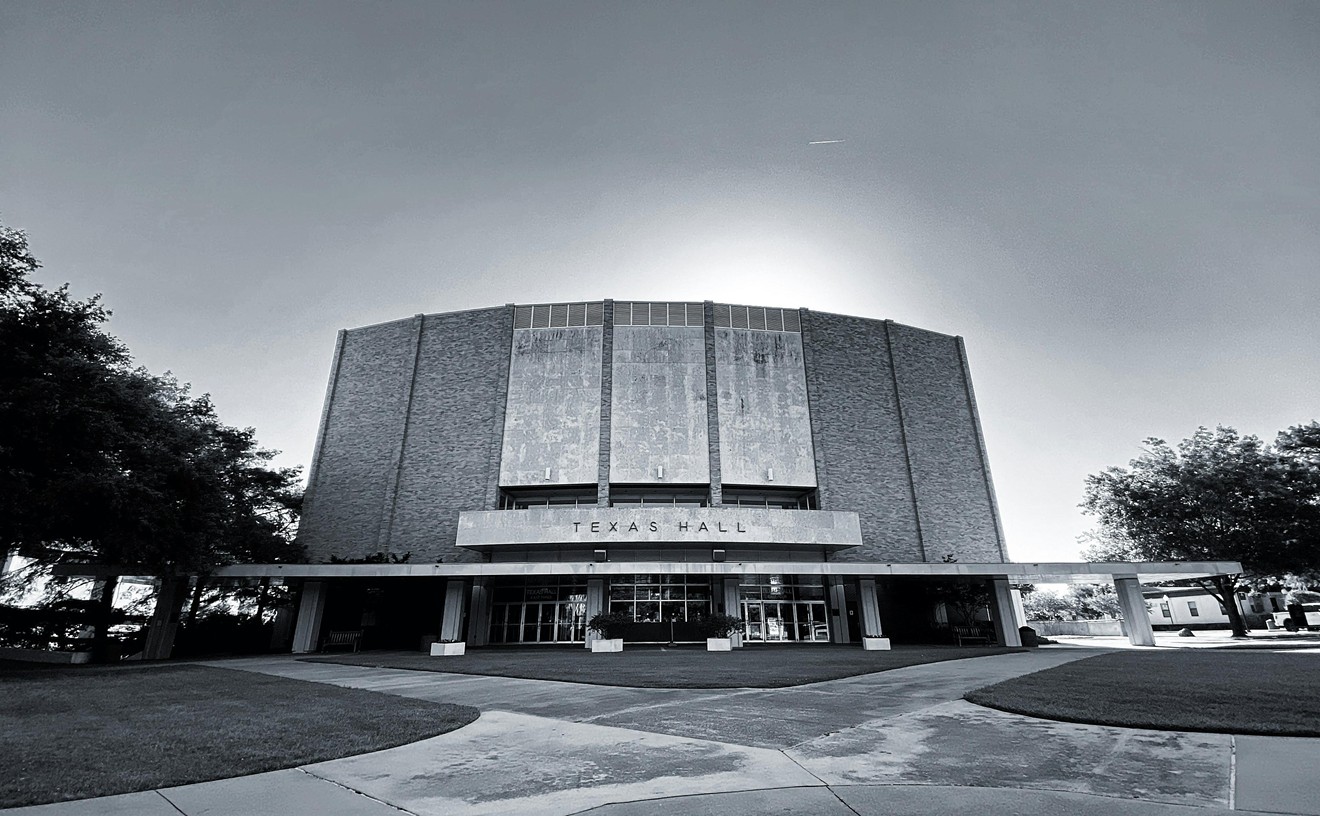Does Dallas have a red-light district? Does the Pope live in Rome?
It's 2:30 a.m., closing time on a Sunday morning, and customers are swarming out of the topless bars on Northwest Highway like fire ants somebody just stomped on. They stumble, they fall, they trot, they wobble, squinty-eyed from booze and smoke, yelling and yahooing in boy voices, from country poor to expense-account slick: These men are far from home.
That's part of the appeal, after all. The men pouring out of clubs at closing time are a "destination" crowd: They travel some distance to get to this place. Stacked around the edges of this parking lot and down the street near Bachman Lake are other topless clubs that have crowded in close in recent years to capture the same customer base.
You gotta get 'em while they're in town, and now they're leaving. Stamping their feet and flailing as if battling a gale-force wind, some men beat a crooked path across 15 yards or so of beer-soaked tarmac to a long queue of waiting taxicabs. A handful of middle-aged rascals in rumpled dress shirts push and shove playfully, waiting their turns to lunge headfirst into a long white limousine like clowns into a barrel; a herd of men in dress-up western wear clamber aboard the rusty bus that brought them here for the evening, they say, from Tulsa, Oklahoma; in a stream of curse words out on the far parking lot, a lone cowboy is calling to his lost pickup truck.
A rough-looking hooker in a late-model automobile circles the scene with her window rolled down, calling out invitations to engage in specific sex acts. Whatever went on inside the clubs, not one man in this large crowd has any love left for the lady of the night. She keeps cruising, and the invitations keep getting more specific.
This is it, the Place Pigalle of Dallas, Boys Town, the city's Zona Rosa. A blind hog could find this place if it were horny enough. The ambiance here has caused many a first-time visitor to gawp and wonder, "Is this legal?"
...and then plunge in.
The question of whether it's legal--whether the city of Dallas can or should shut it down--has produced more than 15 years of bitter and expensive litigation; it has sparked cyclical political scandals at Dallas City Hall in which several council members have been scalded for accepting money from the topless clubs; and it is at the center of the current police chief's ongoing political woes.
And now once again, as at various points in the past, persistent political rumors have it that a "settlement" may be in the works, a truce, a cease-fire, an arrangement by which the city and the clubs could quit making all the lawyers rich.
Several club-owning companies have brought a legion of lawsuits against the city in both state and federal courts. By some counts, as many as 20 separate legal actions are now in various stages of activity, dormancy, appeal or plain-old threat. An official at one topless company estimated the cost to his firm alone at approximately $100,000 a month "when we're at the height of litigation." The city has consistently refused to estimate its own legal costs, saying it can't break out staff time for lawyers who are on the city payroll, but sources familiar with the litigation argue that the city's costs are not all that different from the clubs'.
The key lawsuit right now is the one in 191st State District Court before Judge Catarina Haynes, in which hearings are to begin April 27. In that suit, Burch/Northwest Entertainment Group, Inc., owners of Baby Dolls and the Fare West on Northwest Highway, challenge the basic legitimacy of the city's licensing procedure for sexually oriented businesses, a process by which the Burch licenses have been revoked. A spokesman for City Attorney Madeleine Johnson explained that the clubs are only open now because the lawsuit hasn't yet been decided. If the city wins, the Zona Rosa at Northwest Highway and Webb Chapel Extension is history.
Unless there's a deal.
As settlement offers are by their nature secret, and as various settlement rumors have gone up in smoke in the past, it's difficult to measure how real the new round of rumors may be.
Real or not, all settlement rumors drive the people who oppose the clubs up the wall. "If it's true, I'm going to war," says Bachman-area banker Randy Staff, "and you should know I take no prisoners."
Staff, like the rest of the anti-topless cohort, believes any settlement will leave the Bachman area as some form of red-light district, somewhere on a scale from well-landscaped red-light district to poorly landscaped red-light district. Staff, the husband of Dallas school board President Roxan Staff, insists no red-light district can coexist with mainstream business or residential communities--period.
Staff is the unofficial leader of one of three phalanxes that form a loose-knit coalition against the clubs. His group might be called the green phalanx, for money. "I'm a capitalist," he says. "This is a land-use issue for me."
Another contingent is made up of homeowners concerned about quality of life issues and real estate values. The third phalanx is the Dallas Association for Decency (DAD), a nonprofit group founded in 1986 specifically to battle toplessness. For DAD, the struggle against the clubs is a true holy war in which the hand of God can be seen intervening right down to the fine details, as expressed in the following passage from a DAD newsletter:
"Praise God that federal Judge Jerry Buchmeyer ruled in favor of the City of Dallas regarding the sexually oriented business ordinance. Pray for the salvation of the topless club owners, the protection of the community from their harmful secondary effects, the men led astray by the lure of these clubs and their families, as well as the young women who dance in the clubs."
But what if Staff, the homeowners and the legions for decency are all wrong? What if there is some arrangement by which the city could achieve peace in our time with the topless clubs, without doing violence to the surrounding area? Given the sheer volatility of the topless club issue, shouldn't City Hall look for some way out?
Meanwhile, Northwest Highway at Webb Chapel Extension is what it is. Standing in the middle of the parking lot outside Baby Dolls topless club in the wee hours of a Sunday morning, Tim Dickey, a leader of the neighborhood types, says, "We are truly the de facto red-light district, and some people want to keep it that way."
It's possible to believe Dickey's claim that "some people want to keep it that way" without buying into any major conspiracy theories. In fact, a good question for anyone lucky enough not to live near the Bachman Boys Town is why it should be moved. Part of what fuels the bitter rage of the Bachman activists is the impression, drubbed into them by long, harsh experience, that most of the people "around the horseshoe" on the Dallas City Council would just as soon leave the red-light district where it is, rather than risk moving any part of it into their own districts.
At a recent city council candidates forum in Oak Cliff, Dickey asked candidate Dr. Elba Garcia how she felt about the topless clubs around Bachman Lake. Garcia, wife of state Representative and former city council member Domingo Garcia, is running against incumbent Steve Salazar for the District 1 seat in a "dry" area of the city with no topless clubs. Garcia told Dickey she likes things the way they are and doesn't want to stir the pot for fear of bringing topless clubs into her own district.
According to Dickey and others who were present, Dickey followed Garcia out into the parking lot later to press his point. In the conversation that ensued, Dickey urged Garcia to consider changing her position to his own--that is, to support licensing, zoning and court actions designed to put the Bachman clubs out of business--and he told her that he could bring money to her campaign if she agreed.
Some days later in a conversation with the Dallas Observer, Dickey defended the offer as an attempt to create a level playing field between his neighborhood and the topless operators, who have poured thousands into council campaigns in the past.
"I am totally unapologetic," he said. "That's how you get things done, especially when someone seems to be on the fence or not that well-informed."
The problem with that approach may be that it does, to some extent, level the playing field, at least in moral terms, and that's right where the club owners want it. If it's legitimate for the community activists to offer campaign contributions in exchange for support on a specific issue, they ask, why is it automatically naughty for them to do the same? Rather than a holy war between white hats and black hats, the club owners ask, why shouldn't this battle be viewed as a straight-up contest over land use between equally legitimate competitors?
Steven H. Swander, a Fort Worth attorney who has defended a number of club owners on First Amendment issues, argues that most of the larger clubs have managed to continue operating by staying just inside the law or by staying just inside some judge's restraining order, which, he points out, amounts to the same thing.
Swander is a professorial type who speaks carefully and almost winces when he comes to the more colorful details of what obviously is a specialty, the relationship between body parts and free speech. He spiels off the history of clear latex pasties: the court decision that caused the clubs to switch to non-latex pasties in order to change their status to Class A dance halls and escape location limits, followed by a new ordinance in 1997 focusing on the breast beneath the nipple, struck down by the court, thereby allowing clubs to operate with non-flesh-colored pasties as dance halls rather than sexually oriented businesses.
On the one hand, it doesn't seem right that something as simple as sex should be chopped up into such awkward little parts. On the other hand, no matter how embarrassing the debate may be on the surface, fundamental issues of freedom of expression do run at its core, specifically the ability of a man or woman to use the body and bodily expression to convey to an audience the message, "I want to have sex with you."
In footnotes to legal briefs and in reams of scientific research, an entire literature deals with erotic expression and how people say what to whom. In even finer detail--in the area of law Swander can recite--a body of legal opinion deals with specific body parts and what they have to say for themselves. Great legal minds have concurred that a bared nipple says, "Come and get it," while a halter top says something more like, "Let's take the kids to the beach."
For the most part, American courts have held that the message "Come and get it" is protected speech under the First Amendment. At the same time, the courts also have been consistent over the last 25 years in recognizing that neon-nudie striptease clubs tend to turn the areas around them into red-light districts and that communities have a right to resist that process.
The U.S. Supreme Court, with some stutters and stumbles, has been trying for 25 years to find some way communities can defend themselves against red-light districts without doing violence to the First Amendment. It is less an easy trick than we might think. If the dancing ladies in the clubs can't say, "I want to have sex with you," then the highbrow playwright can't say it either; Pavarotti can't sing it; the Bolshoi can't dance it; and presumably you can't say it in public, whether you mean to or not.
The law can't ban the message in naughty honky-tonk places and allow it in healthy, wholesome venues. If the message were banned everywhere, it's possible that gendarmes might come down the beach one day and warn you that your swimsuit has been saying it behind your back.
What the courts have looked for is a way communities can ban red-light districts without banning speech. Beginning with a U.S. Supreme Court decision upholding a Detroit ordinance in 1976, the courts have held that communities can protect themselves with so-called "content-neutral" ordinances--that is, laws that don't try to control what kind of messages people send each other inside the clubs but do try to prevent concentrations of clubs in any one area. The purpose is to combat precisely the red-light syndrome that besets the area around the 3000 block of Northwest Highway, where as many as seven topless clubs have been in operation at one time in the last three years.
There are two rules, according to the Supreme Court: 1) The ordinance must be content-neutral, and 2) The city must show that its goal is to protect the community from harmful "secondary effects," in other words, the red-light syndrome.
The problem is that a city can't ship the topless clubs off to the far corners or assign them to properly zoned areas until after it has said who they are. It can only say who they are by defining them according to what they do. And every time another new ordinance comes along to try to do that, the club owners go to court arguing: 1) that the new definition is a violation of the First Amendment, and 2) the city hasn't really proved any bad secondary effects it needs to undo.
It may be that no club-owning company in America has done better at this battle over the years than Dallas' own Burch/Northwest Entertainment Group, Inc. In fact, Burch has done better in court than the city has wanted to admit. In 1995, for example, after a former city attorney informed the city council that the city had prevailed in a major federal court decision, the council learned that the federal judge in the case actually had ordered the city to pay $213,417 in legal fees to the club owners and their attorneys--usually not an indication of victory.
But at this very moment, the activists and organizers and business people who have battled the Bachman clubs for better than a decade believe they've got Baby Dolls on the ropes. That's why the talk of settlement rankles them so badly.
"This is the endgame," Dickey said, surveying the parking lot outside Baby Dolls at 3 a.m. The cowboys and conventioneers had all disappeared. A breeze off the highway rolled an empty bottle, which clattered over the rough asphalt. "Why should we compromise now?"
Given where they are now in court, weeks away from a trial that might produce a final answer, Dickey's question seems fair. Why quit the marathon when you're 50 yards from the finish line and still have a shot at winning?
On the other hand, the clubs have been awfully good at moving the finish line. Dallas has been passing laws since 1986 to force the closing or dispersal of the clubs around Bachman Lake. Swander, one of several attorneys who have represented the clubs, can cite chapter and verse on how the clubs have resisted the new laws in court, but basically it always comes down to one thing--the definition of nudity.
"You can prohibit nudity based on secondary effects," Swander says. "Those statutes would include G-strings and pasties."
If the women wear G-strings and pasties, they're nude. Their nudity contributes to the rise of a red-light district around them. The community has a right to use zoning to prevent them from clustering.
So what the clubs have done, in order to stay open, is retreat to just within whatever is the working legal definition of nudity. Now, for example, the dancers wear bikini bottoms and pasties, not G-strings.
Swander explains the anatomical consequences if the owners of Baby Dolls lose the current round of litigation and thereby permanently lose their license to operate a sexually oriented business: Baby Dolls and other clubs would have to change their acts in order to stay open under a dance hall license, and the result, Swander says, would be a shift, "from bikini bottoms and pasties to full bikinis."
Swander argues that the difference between pasties and a bikini top "seems not related to secondary effects." In other words, how can pasties cause neighborhood decline and a bikini top not?
Good question, to which the activists say they have good answers. In the immaculate living room of her tidy 1970s brick ranch-home about one and a half miles northwest of Baby Dolls, Mary Lou Zijderveld produces what she says is the best answer, a detailed study commissioned by the city in 1994 to answer that very question: How can bare breasts cause neighborhood decline?
The report isn't exactly a secret. The city has used it several times to buttress its case against the clubs in court. But neither is it well-known, never once having been reported in The Dallas Morning News, for example.
The report, by well-known Dallas real estate economist and planner Peter Malin, surveyed real estate conditions in the area around Bachman in 1994 and again in 1997. It also looked at studies done in other cities all over the country to examine the same question: What proven effect does a concentration of striptease establishments have on the community around it?
The Malin report concludes: "Sexually oriented businesses and dance halls operating as adult cabarets...have both a real and perceived negative impact on surrounding properties. In such areas, crime rates are higher and property values are lower, and/or the properties take longer to lease or sell. Our study has found that the higher the concentration of these businesses in one locale, the greater their impact on the neighborhood."
A top official of one of the city's larger topless operations was willing to speak to the Observer only on the condition that his name not be used in a story. The Observer agreed to the arrangement after weeks of negotiation, because it was the only way the club owners would provide any access at all. As it turned out, the official offered an argument that seemed to undercut his own lawyer's claim that mere bikini tops could not possibly be linked to secondary effects in the neighborhood.
If the women who dance at Baby Dolls have to switch to full bikinis, top and bottom, the club official said, Baby Dolls would be out of business. "If that happens, the women don't dance," he said. "They don't come to work."
The difference between pasties and bikini tops, in fact, lies at the very heart of the topless club business. The "dancing" that goes on inside the clubs today bears little relation to the old runway bump-and-grind shows of yesteryear, a descendant of burlesque and vaudeville. The dancing inside the clubs now is "lap dancing," in which almost naked women do their bumps and grinds on a man's lap in return for a steady stream of tips to keep them going. It's less a message than a sex act.
The club official said he thought typical day-to-day earnings for the average dancer were from $200 to $300 a night--far lower than estimates by other people familiar with the industry. But the club official agreed that amounts more like $1,000 a night are possible for the best performers.
Obviously, the runway dancer in a bikini with a message about "Barney goes to the beach" is not going to earn the same money as the lap dancer whose message is somewhere between "Come and get it" and "You got it." Therefore, the club official said, the good dancers will migrate to the you-got-it clubs rather than put on bikini tops, and the Barney clubs will close their doors.
Breasts are everything.
The existing laws prohibit customers from touching the naked breasts of dancers on or below the nipple. Given that the business revolves around women with essentially bare breasts grinding up and down on the laps of drunken men in dark corners of seedy bars, it would take extraordinary self-control on the part of everyone involved to make sure the law was upheld.
Forget about it. In the last year, Dallas police have stepped up public lewdness arrests inside Baby Dolls and other clubs. The Dallas County district attorney, in response to urgent requests from the Bachman community, has cut off the practice of offering dancers deferred adjudication and has pressed for jury trials. Within the last few months, that effort has produced enough lewdness convictions to threaten Baby Dolls, the Fare West and other clubs with permanent loss of their licenses.
In the meantime, Burch/Northwest Entertainment's latest suit against the city, challenging the city's license-review procedure, is about to come to trial. The brief for Burch argues that the review process is stacked against topless clubs; that city council members always appoint people to the license-review board who are hostile to the topless industry; and that the whole process is "political."
If the case is not settled and does go to trial, Burch will also argue, as it always has in past cases, that the neighborhood groups opposed to them are a false front. The charge is that the leaders of the opposition, people such as Staff, Dickey and Zijderveld, either don't live in the Bachman area at all or live too far from the clubs to claim any secondary effects. Their real motivation, according to the club owners, is moral zealotry.
Zijderveld counters that a mile and a half is close enough to feel the impact when the clubs have turned the nearest major commercial center into a red-light district. "I'm sure if I wanted to sell my house, it would take me longer, and I probably would get less than if they weren't there," she said.
Staff, who lives far from the area in the Lakewood section of East Dallas, has always said his interest was purely commercial: He does own a bank near the clubs. He says a steady stream of his best business customers have departed from the area since the mid-1980s when the clubs started coming in. At a desk in the bank one afternoon after closing, he counted down the list of respectable restaurants and businesses that have closed nearby since the mid-'80s.
"The McDonald's just closed down in the last couple weeks. People wouldn't bring their children here. Tupinamba, Steak and Ale, Chili's Grill and Bar, Black-eyed Pea, Vincent's Seafood, RJ's By the Lake, the original Great Outdoor Sub Shop, they're all gone.
"This isn't a moral crusade for me. This is pure business."
That doesn't mean it's not a moral crusade for others. Dan Panetti is executive director of the Dallas Association for Decency. Panetti, a lawyer, says that he is also a realist and knows his organization may never achieve its ultimate goal.
In an office at the back of a North Dallas shopping center, he asks, "Do people have a right to do things we don't approve of? Yes. I can say that I know that I can't eliminate the sexually oriented businesses. But would I, from a personal standpoint, rather see that no sexually oriented businesses exist in Dallas? The answer is exactly yes."
On a large wall map of the city across from his desk, colored push pins show the location of what he says are all of the city's sexually oriented businesses. The locations are based both on city licenses and on some sort of patrol or surveillance that Panetti and his organization have carried out.
This is a war for Panetti, one he relishes, and he is candid about why. His organization is founded on the conviction that pornography and sex for money constitute an addictive disorder that destroys lives just as narcotics and gambling do. In what Panetti calls "a sex-saturated culture," he sees value and importance in standing up publicly for propriety.
"If there's no more victory than that, than being able to express that value, it's enough," he says.
The other phalanxes opposed to the topless clubs say they have no more than a friendly alliance with DAD based on their mutual opposition to the clubs. Panetti says a little ruefully that the distance between the groups is even greater than that in certain key respects. "I don't see any checks coming in to DAD from them or from their churches," he says of the Bachman community.
But taken together, the activists and the moralists do make up the opposition, and what they share is an adamant hostility to the notion of settlement or compromise. Michael Jung, an attorney who has represented Staff and some of the neighborhood groups on these issues, says the mood of the opponents makes it difficult to imagine any compromise that both sides would accept.
"I don't think there is a compromise possible that would leave any of the topless clubs in place in the Bachman area," Jung says.
Perhaps the best clue to the kind of compromise the clubs might propose is in the 1994 Fort Worth sexually oriented business ordinance of which Swander, the First Amendment lawyer who has represented several Dallas clubs, was a co-author. The ordinance codifies a political deal by which a group of the city's better-established, more prosperous clubs agreed to a set of sign restrictions, landscaping requirements and other measures designed to hide their clubs from view, along with an agreement not to try to move into certain high-tourism areas of the city. In exchange, the city exempted the clubs from zoning requirements.
It was a truce, based on a novel concept. A person who was close to the negotiations that led to the Fort Worth deal, who spoke to the Observer on the condition that his name not be published, said, "If you could get both sides of that deal to be honest with you, the clubs and the city, they'd all agree that the Fort Worth law probably isn't constitutional."
And so what, he suggested. It's an Old West deal. The clubs agree to cover up and stay put. The city agrees to lay off. And the real hammer--the thing that holds the deal together--is the fact that it would be far too expensive for any new club operator to come in from the outside and try to out-lawyer the city of Fort Worth and the grandfathered clubs at the same time.
It's a kind of sex syndicate, all between good ol' boys. Typical Fort Worth, perhaps, but would it fit Dallas? The Fort Worth deal is exactly what the club owners want at Bachman. They won't say anything publicly about it now, but at various points in the past they have made explicit offers to the city that have paralleled the Fort Worth deal. In exchange for a permanent truce, Burch and other owners have promised to agree to all sorts of cosmetic measures and have even agreed to buy up the smaller clubs around them and shut them down.
That would leave Bachman with a well-landscaped red-light district. What frightens the Bachman activists most about the idea is that they can see, probably better than most, why the idea might sell to everybody else in Dallas but them.
They get the red-light district. Nobody else does.
But what may look like an easy way out to people in other parts of the city starts looking bloodier the closer you get to Bachman Lake.
"Let them try it!" Staff vows. "Does Randy Staff have a million dollars to fight them with? You bet I do. And you bet I will."
His voice rising slowly to an Alamo shout, Staff says: "What are they going to do to me? Turn my neighborhood into a red-light district, run off all the decent restaurants and screw up my bank?"











